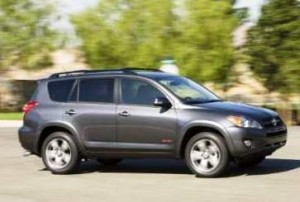Look for Toyota to pull the wraps off a new battery-driven version of the RAV4 at the upcoming Los Angeles Motor Show. It will be the first product of a new joint venture between the Japanese maker and the California start-up Tesla Motors.
Meanwhile, the company has also announced that it will begin delivering a plug-in version of the Prius hybrid to North American showrooms by May or June of 2012. That comes about 18 months later than the company had initially indicated.
That delayed debut will come at about the same time Toyota will launch six new global hybrid vehicles, all of which will reach market by the end of 2012, according to Executive Vice President Takeshi Uchiyamada.
The alliance between Toyota and Tesla has generated plenty of industry discussion and debate since it was first announced last June. Initially, the Japanese giant said it would be willing to invest $50 million in the California firm’s IPO, which later proved unexpectedly successful. Toyota also announced it would turn over the abandoned NUMMI plant, in Fremont, California, to Tesla to use to produce the smaller maker’s planned Model S battery sedan.
Subsequently, however, Toyota revealed it would work with Tesla to develop new battery drive technology. That move was unusual because Toyota has traditionally been reluctant to form alliances with potential competitors. But some industry sources believe the Japanese manufacturer is looking for new technology after having pushed its Hybrid Synergy Drive – used in such products as the popular Prius hybrid – to the limits.
What is unclear is just what sort of powertrain will be used in the Toyota RAV4-EV making its debut at the 2010 Los Angeles Auto Show, in November. The automaker is, for the moment, only saying that it will be a pure battery-electric vehicle, or BEV. Whether that means an oversized version of the electric drive system in Tesla’s first model, the 2-seat Roadster, remains to be seen.
But one thing is clear, it reflects a distinct shift in direction for the Japanese maker. As recently as a year ago, top Toyota officials were dismissing BEVs and their underlying lithium-ion batteries. Like its competitors, Toyota saw LIon technology as expensive, bulky and providing relatively limited range. The Japanese automaker also had a particularly bad experience while trying to develop its own LIon batteries using a form of the chemistry based on the metal cobalt.
Cobalt-doped lithium batteries can store significantly more energy than other versions of the batteries – which translates into longer range. But that particular chemical formulation is especially sensitive to nano-level manufacturing defects and Toyota had to move to an alternate approach, something that set the company back behind its competitors.
With virtually all of the industry’s key players moving to lithium-based battery power, however, Toyota has been in the unusual position of having to play catch-up – and to take steps like the alliance with Tesla to try to accelerate the process.
Though details haven’t been released, there are indications the RAV4-EV could hit the road sometime in 2012. But, by then, Nissan will already have more than a year to build demand for its Leaf 5-seater, and perhaps to launch one or more of the other BEVs it hints it is working on.
Other makers, including Ford Motor Co., will also have battery cars of their own on the road by then. The U.S. maker has acknowledged plans to develop lithium-powered versions of both the Transit Connect van and Focus sedan.
A 2012 launch of the Prius plug-in would also put Toyota behind key competitors in this soon-to-emerge market segment. Ford has three plug-ins coming, for example, and General Motors will begin sales in November of the new Chevrolet Volt. Officially described as an extended-range electric vehicle, or E-REV, the 2011 Volt will be able to drive up to 40 miles on battery power before a small internal combustion engine kicks in for longer journeys.
That’s more than double the 17-mile battery range that Toyota has promised for the Prius PHEV. The 2011 Chevy Volt will also be able to achieve a 90 mph top speed – as will the Nissan Leaf – while Toyota has said the plug-in Prius will operate on battery power only up to about 100 km/h, or 62.5 mph.
Nonetheless, Toyota division chief Bob Carter has told TheDetroitBureau.com he expects strong demand for the plug-in building on the already substantial market for Prius, the world’s best-selling hybrid. A Twitter-based release from the maker, this morning, suggested that it anticipates selling “20K+,” or at least 20,000, of the Prius plug-ins annually in North America.
But the surprise news is that while Toyota still plans to begin U.S. fleet testing by the end of this year, it won’t launch retail sales until, the Twitter release stated, a “may/June 2012 time frame.” Whether the maker is slowing the roll-out to avoid the sort of quality problems other recent products have faced is unclear. It may also be looking for ways to enhance the performance – both in terms of range and top speed – before pitching the Prius PHEV to consumers who will, by then, have a number of other environmentally-friendly options to consider.

